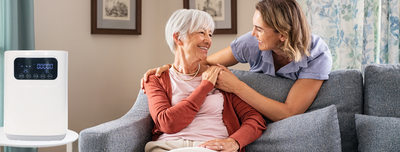Choosing Between Portable and Home Units
In the realm of respiratory care, the decision to invest in an oxygen concentrator is a pivotal one, and the market offers a diverse array of options. Two primary categories, portable oxygen concentrator (POC) and home oxygen concentrator (HOC), cater to different needs and lifestyles. In this blog post, we'll explore key considerations to guide you in making an informed choice between these two essential devices.
Portable Unit and Home Unit
Portable Oxygen Concentrator (POC):
For individuals with an active lifestyle or those who frequently find themselves on the move, POC offer a liberating solution. These compact devices, often equipped with convenient carrying options, provide the flexibility to maintain oxygen therapy while engaging in various activities, from shopping to travel adventures.
Home Oxygen Concentrator (HOC):
HOCs, on the other hand, are equipped to deliver higher flow rates, accommodating individuals with more significant respiratory challenges or those requiring continuous therapy. If your oxygen needs are consistently higher, an HOC may be the more suitable choice.
Determining Oxygen Flow Requirements
Portable Oxygen Concentrator (POC):
POC typically offer lower oxygen flow rates compared to HOC. It's crucial to assess whether the POC can meet your specific flow rate requirements based on your medical prescription. For those with moderate oxygen needs during daily activities, a POC may be an excellent fit.
Home Oxygen Concentrator (HOC):
HOCs, on the other hand, are equipped to deliver higher flow rates, accommodating individuals with more significant respiratory challenges or those requiring continuous therapy. If your oxygen needs are consistently higher, an HOC may be the more suitable choice.
Considering Battery Life and Power Source
Portable Oxygen Concentrator (POC):
A significant advantage of POC lies in their portability, facilitated by battery-powered operation. When selecting a POC, evaluate the battery life to ensure it aligns with your daily activities. Additionally, check whether the POC can be conveniently charged using different power sources, providing flexibility during travel.
Home Oxygen Concentrator (HOC):
HOC rely on a constant power source, usually an electrical outlet. While they lack the portability of POC, they eliminate concerns about battery life, making them suitable for individuals who spend the majority of their time at home.
Size and Portability
Portable Oxygen Concentrator (POC):
POCs are engineered for portability, featuring compact designs and lightweight construction. Consider the ease with which you can transport the POC, whether for short outings or more extended travel. Some POC even come with convenient carrying cases or rolling carts for added mobility.
Home Oxygen Concentrator (HOC):
HOCs tend to be larger and bulkier due to their stationary nature. While they may lack the portability of POC, their size often corresponds to increased oxygen production capacity, ensuring a consistent and sufficient oxygen supply within the home.
Conclusion
The choice between a Portable Oxygen Concentrator (POC) and a Home Oxygen Concentrator (HOC) hinges on understanding your lifestyle, oxygen therapy requirements. If you lead an active life and require oxygen on the go, a POC may be the preferred choice. For those whose oxygen needs are primarily at home and involve continuous therapy, an HOC may provide the necessary support. Consulting with healthcare professionals and carefully weighing these factors will ensure that your choice aligns with both your medical needs and day-to-day activities. Ultimately, the goal is to enhance your quality of life while receiving the oxygen therapy that suits your individual circumstances.











